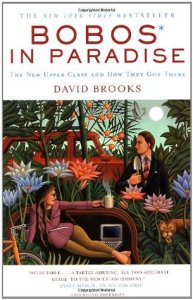Title: Bobos in Paradise: The New Upper Class and How They Got There
Author: David Brooks
Genre: Sociology
Trigger Warnings: None
Back Cover:
Do you believe that spending $15,000 on a media center is vulgar, but that spending $15,000 on a slate shower stall is a sign that you are at one with the Zenlike rhythms of nature? Do you work for one of those visionary software companies where people come to work wearing hiking boots and glacier glasses, as if a wall of ice were about to come sliding through the parking lot? If so, you might be a Bobo.
In his bestselling work of “comic sociology,” David Brooks coins a new word, Bobo, to describe today’s upper class–those who have wed the bourgeois world of capitalist enterprise to the hippie values of the bohemian counterculture. Their hybrid lifestyle is the atmosphere we breathe, and in this witty and serious look at the cultural consequences of the information age, Brooks has defined a new generation.
Review:
I read this book back in high school – it was one of the texts for my AP Sociology class. And I enjoyed it so much that I kept it after the class was over. Lately I’ve been wanting to reread it, so here we are.
This is mainly a sociological text examining the phenomenon of “bourgeois bohemians.” Brooks calls them “Bobos,” I explain them to people who ask what this book is about as “basically hipsters.” Because that’s pretty much what they are, with their “natural/rustic is better” aesthetic and their love of things that are new but look old and their willingness to pay lots of money for handmade/organic/artisan versions of normally cheap things. Brooks’ name for them comes from the way they developed as a blend of the bourgeois capitalist upper class and the artistic bohemian counterculture.
Brooks and I differ on what we consider “upper class,” though. What Brooks describes as upper class in this book is what I think of as upper middle class. Upper class is, to me, people like Jeff Bezos and Elon Musk – people who have so much money they can’t think of anything better to do with it than buy politicians or shoot luxury cars into space. Whereas the people who Brooks describes are making $100,000+ per year and have debt from living beyond their means. Which sounds more upper middle class than middle class to me.
I’m also not sure how accurate this book is anymore. It was published in 2000, and while I can still see some of the things Brooks points out (especially in the area of cultural values), some of the things he says don’t seem applicable these days. Notably the chapter on politics – Brooks’ point in that section is that Bobos are more moderate and shy away from any sort of radicalism or anything that’s too ideological or dogmatic. And looking at the current state of American politics and our hyperconservative, highly ideological, highly dogmatic current administration, it’s pretty easy to see that that is not true.
Accurate or not, though, Bobos in Paradise is still a highly interesting (and entertaining) read and gives a glimpse of a lifestyle that seems simultaneously hypocritical and desirable. If you’re looking for insight into today’s world, this might not be the best place for you to go, but if you want to learn about hipsters and where the upper middle class was headed in the early 2000s, this book will be an enjoyable place to get your information.

